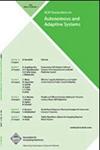Adaptive Resource Provisioning for Virtualized Servers Using Kalman Filters
IF 2.2
4区 计算机科学
Q3 COMPUTER SCIENCE, ARTIFICIAL INTELLIGENCE
引用次数: 40
Abstract
Resource management of virtualized servers in data centers has become a critical task, since it enables cost-effective consolidation of server applications. Resource management is an important and challenging task, especially for multitier applications with unpredictable time-varying workloads. Work in resource management using control theory has shown clear benefits of dynamically adjusting resource allocations to match fluctuating workloads. However, little work has been done toward adaptive controllers for unknown workload types. This work presents a new resource management scheme that incorporates the Kalman filter into feedback controllers to dynamically allocate CPU resources to virtual machines hosting server applications. We present a set of controllers that continuously detect and self-adapt to unforeseen workload changes. Furthermore, our most advanced controller also self-configures itself without any a priori information and with a small 4.8% performance penalty in the case of high-intensity workload changes. In addition, our controllers are enhanced to deal with multitier server applications: by using the pair-wise resource coupling between tiers, they improve server response to large workload increases as compared to controllers with no such resource-coupling mechanism. Our approaches are evaluated and their performance is illustrated on a 3-tier Rubis benchmark website deployed on a prototype Xen-virtualized cluster.基于卡尔曼滤波的虚拟化服务器自适应资源发放
数据中心中虚拟化服务器的资源管理已经成为一项关键任务,因为它能够以经济高效的方式整合服务器应用程序。资源管理是一项重要且具有挑战性的任务,特别是对于具有不可预测的时变工作负载的多层应用程序。使用控制理论的资源管理工作已经显示出动态调整资源分配以匹配波动的工作负载的明显好处。然而,针对未知工作负载类型的自适应控制器所做的工作很少。本文提出了一种新的资源管理方案,该方案将卡尔曼滤波集成到反馈控制器中,以动态地将CPU资源分配给托管服务器应用程序的虚拟机。我们提出了一组连续检测和自适应不可预见的工作负载变化的控制器。此外,我们最先进的控制器还可以在没有任何先验信息的情况下进行自我配置,在高强度工作负载变化的情况下,性能损失仅为4.8%。此外,我们的控制器经过增强,可以处理多层服务器应用程序:通过使用层之间的成对资源耦合,与没有这种资源耦合机制的控制器相比,它们可以改善服务器对大量工作负载增加的响应。对我们的方法进行了评估,并在部署在xen虚拟化原型集群上的3层Rubis基准网站上展示了它们的性能。
本文章由计算机程序翻译,如有差异,请以英文原文为准。
求助全文
约1分钟内获得全文
求助全文
来源期刊

ACM Transactions on Autonomous and Adaptive Systems
工程技术-计算机:理论方法
CiteScore
4.80
自引率
7.40%
发文量
9
审稿时长
>12 weeks
期刊介绍:
TAAS addresses research on autonomous and adaptive systems being undertaken by an increasingly interdisciplinary research community -- and provides a common platform under which this work can be published and disseminated. TAAS encourages contributions aimed at supporting the understanding, development, and control of such systems and of their behaviors.
TAAS addresses research on autonomous and adaptive systems being undertaken by an increasingly interdisciplinary research community - and provides a common platform under which this work can be published and disseminated. TAAS encourages contributions aimed at supporting the understanding, development, and control of such systems and of their behaviors. Contributions are expected to be based on sound and innovative theoretical models, algorithms, engineering and programming techniques, infrastructures and systems, or technological and application experiences.
 求助内容:
求助内容: 应助结果提醒方式:
应助结果提醒方式:


